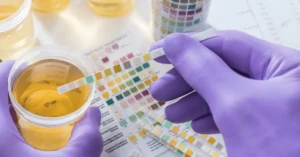Let’s slow down for a moment. You are probably reading this because you’ve found a lump or bump or blister on your genitals.
Firstly, here is a quick list of just a few of the common things that can cause a lump or bump in your genital area, and there are many!
Cysts
The vulva has multiple glands, all of which can sometimes become clogged, resulting in a cyst. You can also get cysts in the vagina and on the penis. Depending on the size and location of the cyst, various treatments are available, and most cysts are painless.
Genital warts
One of the most common confusions is between genital herpes and genital warts. They are not the same and are not caused by the same virus. Genital warts can be treated with topical treatment and cryotherapy.
Ingrown hair
Ingrown hairs are common and can develop into a boil or bump. It’s especially common if you remove your pubic hair by shaving or waxing. Boils caused by ingrown hair can be painful to the touch and can grow and get infected, so if it doesn’t go away using the usual methods, it’s good to see a doctor for treatment.
Skin tags
Skin tags are common in 25% of adults and can occur on various parts of the face and body, including the genital area. They aren’t dangerous and don’t hurt, but they make you worry if you don’t know what they are. Removal is usually only for cosmetic reasons.
Varicose veins
Some people develop varicose veins in the genital area. For example, it can occur frequently during pregnancy due to increased blood flow to the area. Varicose veins will appear lumpy and naturally cause concern.
OK, thanks for that, but I really think it’s herpes
If you think you might be experiencing an outbreak of genital herpes, you need to see a doctor or a specialist nurse for a diagnosis. A diagnosis is typically made through a physical examination and a PCR swab of one of the bumps or lesions for the presence of the herpes simplex virus.
Genital herpes is characterised by all or some of the following symptoms:
- Tiny white-headed blisters
- Small reddish bumps
- Pain and tenderness in the genital area
- Itching in the genital area
- Fever, feeling run down
When the blisters finally rupture, they will likely bleed and excrete their contents. When they open up, they cause ulcers, which are sore and can sting, especially when you pee. After a while, scabbing and crusts will form over the ulcers and they will heal.
The sores can develop in several areas, and it is possible to spread the infection by touching the sores, then touching other parts of your body. Common sites for sores are your bottom and thighs, mouth, anus, vaginal area and external genitalia (vulva), penis and scrotum.
This is really scary!
Many people share this sentiment, and it’s understandable. Although genital herpes is not “curable”, it is manageable, and many people live with it successfully:
- Recurrences tend to be less severe than the original outbreak
- There is medication available to reduce the severity of symptoms
- You can help reduce the occurrence of outbreaks through a healthy lifestyle, boosting your immunity and avoiding stress
The first step is a diagnosis, and the earlier you see someone, the better. Our doctors and specialist nurses are available Monday through Friday, and we can provide fast testing and treatment. Book online today.

















